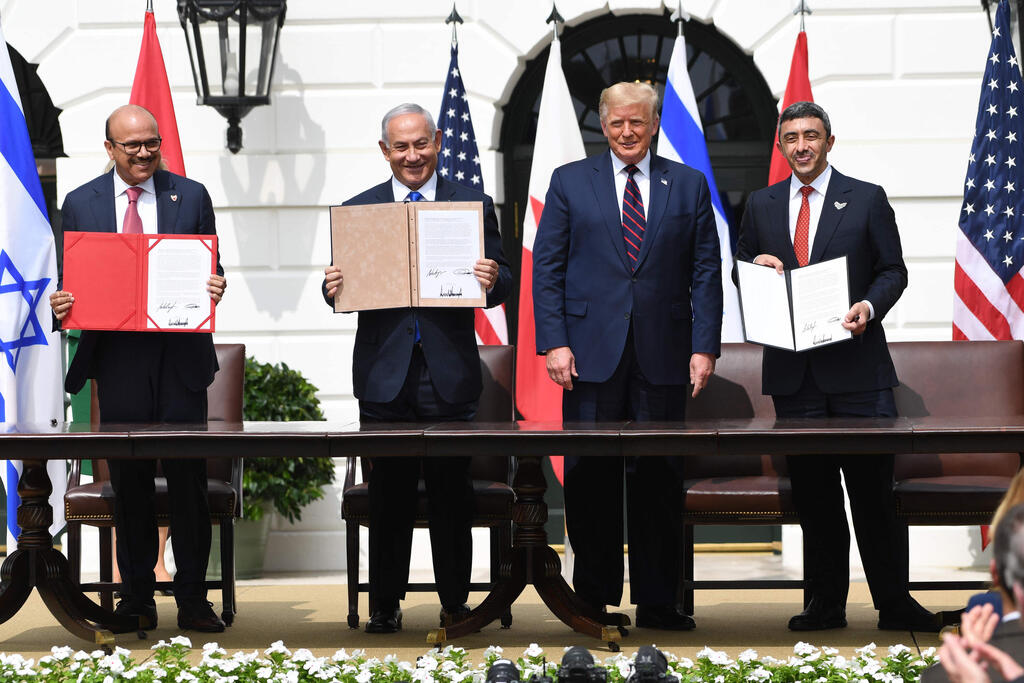Getting your Trinity Audio player ready...
Over three years have elapsed since the signing of the Abraham Accords, normalizing relations between Israel and the United Arab Emirates, Bahrain and Morocco.
Read more:
Despite the war in Gaza, these agreements have remained intact, as have the peace treaties with Jordan and Egypt, despite calls in some of these countries to sever ties. Saudi Arabia, which was next in line for normalization with Israel, halted the process following the war in the Gaza Strip.
3 View gallery


L-R: Bahrain FM Abdullatif al-Zayani, PM Benjamin Netanyahu, US President Donald Trump and Emirati FM Abdullah bin Zayed Al-Nahyan at the signing of the Abraham Accords at the White House
(Photo: AFP)
Abraham Accords signatories have issued several condemnations since the onset of the hostilities. The United Arab Emirates condemned the ground operations in the Gaza Strip, and the king of Morocco denounced Israel's policy in the Hamas-ruled enclave and its "attempt to impose a new reality." He also said that the recent escalation is a result of the lack of a political horizon for the Palestinian issue. Morocco's Foreign Ministry also issued condemnations against Israel throughout the war.
These countries are part of the Arab world, which in recent months has been particularly trying to present a unified front to the rest of the world. These messages call for an end to the war in Gaza, protection of its residents and the immediate introduction of humanitarian aid.
Abraham Accords signatory states face pressures from their Arab peers and are subject to attacks from Iran and its proxies, which view them as traitors and collaborators with the Israelis and Americans.
Bahrain went a step further and joined a U.S.-led coalition against the Houthis in the Red Sea. Reports from early November suggested Manama would freeze economic relations with Israel, but were later proven incorrect.
Since the beginning of the war, Morocco has seen many demonstrations in support of Gaza. Local sources indicate these protests, permitted by the government and king, are primarily a "pressure release valve" for citizens and not a major concern, posing no threat to the normalization with Israel.
Last Friday, thousands joined solidarity protests for Gaza's residents across Morocco. Qatari newspaper Al-Araby Al-Jadeed reported that over 130 demonstrations took place in 66 Moroccan cities that day, including Tangier, Fez, Marrakech, Casablanca and Meknes.
According to some experts, Abraham Accords signatories, known for their opposition to the Shiite Iranian axis, do not want Hamas to succeed. They prefer Israel to eliminate Hamas to curb Iran's rising influence in the region.
Therefore, the war in Gaza, or an Israeli victory over Hamas, may temporarily delay or halt relations with these normalization countries. However, in the long or very long term, the war in Gaza should not hinder the development of relations with these countries.
Some argue that if Hamas were no longer a factor in the region, these countries could enhance their ties with Israel without interference.
Relations with Israel hold significant value for these nations due to economic and security interests, which may override any demands for disengagement. The public disapproval expressed by these countries towards Israel acts primarily to soften domestic and international criticism.





